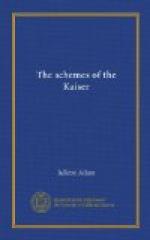A German pamphlet published two years ago, entitled Caligula; a Study of Caesarian Madness, by Mr. Quidde, achieved such a success, that hundreds of thousands of copies were bought up in a few days by the faithful subjects of the German Emperor. This pamphlet, ingeniously compiled by means of quotations from Suetonius, Dion Cassius, Philo, etc., gives a marvellous analysis of the character of William II. I cannot resist the pleasure of giving a few extracts from this little work, for it would appear that William II is endeavouring, since its publication, to emphasise the resemblance between himself and Caligula and Nero.
“The dominant feature in the actions of Caligula lies in a certain nervous haste, which led him spasmodically from one obsession to another, often of a self-contradictory nature; moreover, he had the dangerous habit of wanting to do everything himself. Caligula seems to have a great fondness of the sea. The strolling-player side of his character was by no means limited to his military performances. He was passionately devoted to the theatre and the circus, and would occasionally take part himself on the stage, led thereto by his peculiar taste for striking costumes and frequent changes of clothing. He was always endeavouring to shine in the display of eloquence; and was fond of talking, often in public. We know that he developed a certain talent in this direction, and was particularly successful in the gentle art of wounding people. His favourite quotation was the celebrated verse of Homer—
There is only one Master, only one King.
Sometimes he loved the crowd, and sometimes solitude; at other times he would start out on a journey, from which he would return quite unrecognisable, having allowed his hair and beard to grow.”
Just as the names of Caligula and Nero are daily affixed in Germany to the name of William II, Herr Hinzpeter is called Senecus, General von Hahnke is known as Burrhus; there is also an Acte and a Poppea at Berlin. Frederick III is Germanicus and Prince Bismarck is called Macro, after the powerful prefect of the praetorium in disgrace. Like Nero, William II has been cruel to his mother; he is cruel to his sister, the Princess of Greece. He hates England, just as Caligula hated Brittany. With a mind like that of Nero, William II derives the greatest pleasure from the thought of degrading the French people by making them receive him with acclamation. What a triumph it must be for this grandson of William I (who defeated us but left us our honour) thus to bring us to dishonour: us, the descendants of the France of 1789, republicans in the service of a Prussian Caesar!
June 10, 1897. [11]




